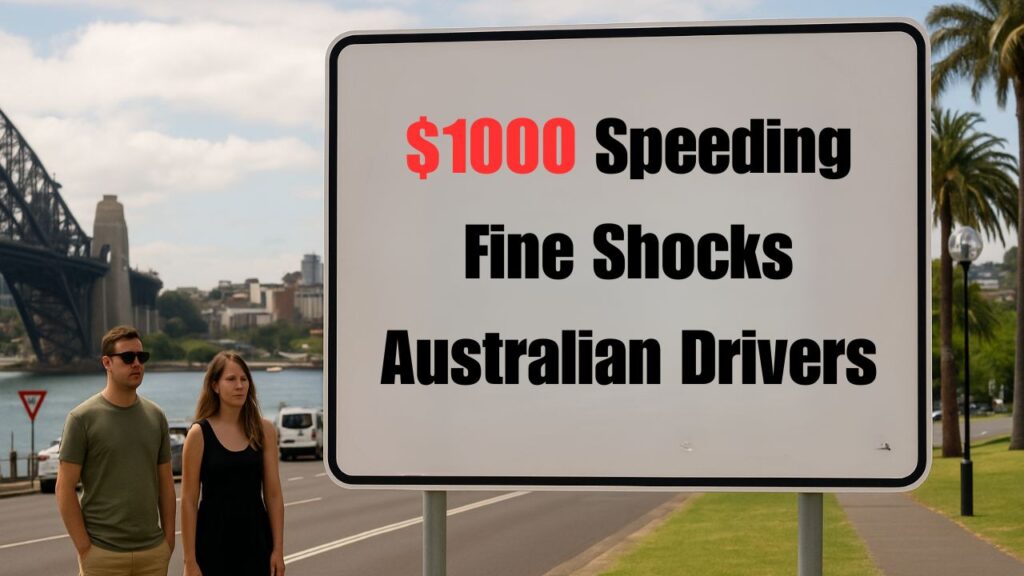Australia Speeding Fine Warning – Australia has tightened its road safety laws with a new $1,000 speeding fine targeting drivers who exceed 45km/h over the limit. This change, effective from 2025, marks a serious crackdown by Australian authorities on reckless driving and high-speed offences. The new penalties aim to reduce fatalities on Australian roads and encourage safer behaviour behind the wheel. Drivers are now urged to understand the updated regulations, the risks involved, and the long-term implications of being caught under these stricter rules introduced by the government.

New $1,000 Speeding Fine Rules for Australian Drivers
The latest traffic enforcement laws in Australia have raised the maximum fine to $1,000 for anyone caught driving over 45km/h above the posted limit. This penalty applies across all states and territories, reflecting a nationwide effort to make roads safer. The Australian government has also introduced mandatory licence suspensions and potential jail time for repeat offenders. For many Australians, these changes serve as a wake-up call about the growing emphasis on road discipline. Authorities believe the tougher penalties will help reduce high-speed crashes and promote more responsible driving habits across the country.
 Melbourne Retirees Hit Hard – Annual Living Costs Jump $13,000 in 2025, Here’s What You Need to Know
Melbourne Retirees Hit Hard – Annual Living Costs Jump $13,000 in 2025, Here’s What You Need to Know
Speeding Penalties and Licence Suspension for Australian Motorists
For Australian motorists, the new speeding fine is more than just a financial setback — it can result in the loss of a driver’s licence for up to six months. The revised system introduces immediate suspensions for those exceeding 45km/h, regardless of their previous record. This initiative aligns with broader road safety campaigns across Australia, especially in urban regions like Sydney, Melbourne, and Brisbane. Law enforcement agencies are now using advanced radar and AI-driven detection systems to catch offenders. The policy highlights the government’s zero-tolerance approach towards dangerous driving and its commitment to protecting Australian road users.
| Offence Type | Speed Over Limit | Fine Amount (AUD) | Licence Suspension |
|---|---|---|---|
| Minor Speeding | 10–19 km/h | $300 | 1 month |
| Moderate Speeding | 20–29 km/h | $600 | 3 months |
| Severe Speeding | 30–44 km/h | $800 | 4 months |
| Major Offence | 45+ km/h | $1,000 | 6 months |
| Repeat Violation | Any | $1,500 + Court | 12 months |
Driving Over 45km/h Now a Major Offence in Australia
Driving more than 45km/h over the limit is now officially categorised as a major offence in the Australian traffic code. This classification places it in the same severity range as drink-driving and reckless endangerment. Offenders may face fines, mandatory court appearances, or even imprisonment. The new regulations demonstrate how seriously the Australian authorities view road safety in 2025 and beyond. Educational campaigns and road awareness drives are also being promoted nationwide, reminding citizens that driving responsibly not only saves money but lives as well.
Road Safety Campaigns and Awareness Initiatives Across Australia
To support the new speeding fine policy, the Australian Transport Safety Bureau has launched nationwide awareness campaigns. These initiatives focus on educating citizens about the risks of excessive speeding, especially in school zones and rural highways. Local councils have started installing more speed cameras, and police are increasing mobile patrol units. The combined approach — stricter enforcement and awareness — aims to make Australian roads safer for everyone. Drivers are encouraged to stay informed, follow limits, and play their part in reducing road fatalities across Australia.
Frequently Asked Questions (FAQs)
1. When did the $1,000 speeding fine start in Australia?
The new speeding fine took effect from early 2025 across all Australian states and territories.
2. What happens if I exceed 45km/h over the limit?
You may receive a $1,000 fine, immediate licence suspension, and possible court action depending on your driving record.
3. Can Australian drivers appeal against a speeding fine?
Yes, drivers can appeal the fine in court, but they must provide strong evidence or mitigating circumstances.
4. Are there different fines for each state in Australia?
While the base fine is similar, some states may have slightly higher penalties or longer suspension periods.



